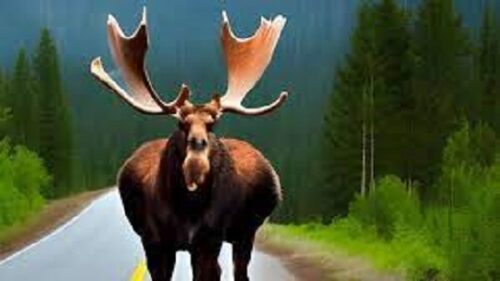14 March 2023
By Erin Blakemore – The WashingtonPost
Don’t mess with moose. They’re big, they’re strong — and now researchers say they may be contributing to climate change. Yes, research suggests that moose may factor into a dramatic reduction in the amount of carbon stored in some forests.

Wherever they feed, the large mammals trample vegetation, affect tree growth and change soil composition with copious amounts of urine and dung. That’s partly due to their voracious appetites — adult moose can eat up to 60 pounds of food per day.
A group of Norwegian researchers wanted to understand how moose feeding affects boreal forests at high latitudes. These forests make up nearly 30 percent of Earth’s forest area, and they capture carbon dioxide from the atmosphere and store it in plants and soil.
It turns out moose disrupt that storage in a big way. Writing in the Journal of Geophysical Research: Biogeosciences, researchers said they analyzed 11 years of data on moose in Norwegian forest areas that had been cleared for lumber. Usually, the forest rebounds, and saplings and bushes quickly grow back. But when moose are on the loose in these areas, they graze on any and all vegetation, snacking on the saplings that would eventually repopulate those areas of forest and sequester carbon.
The moose mostly ate birch, rowan and willow trees. The researchers estimate that by eating up potential carbon sinks, the moose consume the equivalent of 10 percent of the entire Norwegian forestry industry’s annual harvest, cutting carbon storage by up to 60 percent in those areas.
On the other hand, moose feeding also affected the reflectivity, or albedo, of the forests. By clearing the trees, the moose enable more light to reach, and bounce off, the forest floor. This cools the forest for years until the canopy recovers, the researchers write.
“It was really a surprise to see how much moose can influence vegetation growth, the carbon cycle and the climate system,” Xiangping Hu, a researcher at the Norwegian University of Science and Technology and co-author of the study, said in a news release. The scientists say more research is needed to fully understand moose’s potential effects on climate.
We bring leather, material and fashion businesses together: an opportunity to meet and greet face to face. We bring them from all parts of the world so that they can find fresh partners, discover new customers or suppliers and keep ahead of industry developments.
We organise a number of trade exhibitions which focus on fashion and lifestyle: sectors that are constantly in flux, so visitors and exhibitors alike need to be constantly aware both of the changes around them and those forecast for coming seasons.